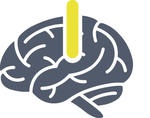DEEPER project
Direktzugriff
Artikelaktionen
The understanding and treating brain disorders, such as Alzheimer’s disease, addiction, chronic pain, depression and schizophrenia, entails the comprehension of alterations that may occur in deep regions of the gray matter. The European-funded project DEEPER will develop new photonic technologies to access those regions and reveal the molecular and cellular dysfunctions underlying the origin of these disorders. New technological tools will be developed with the goal to directly treat these diseases in a minimally invasive and highly effective way. DEEPER will transfer the technological results from laboratory to market, with the ambition to strengthen Europe’s industrial position in the biophotonic market.
The DEEPER project (Deep Brain Photonic Tools for Cell-Type Specific Targeting of Neural Diseases) is funded by the European Union with about 5.7 million euros for the next 4 years, through one of the most technologically ambitious financing systems, the Research and Innovation Action (RIA) on “Disruptive photonics technologies” (ICT-36-2020). The project is a large-scale European initiative involving 12 partners in 8 countries. The international research consortium will be coordinated by Massimo De Vittori at the Instituto Italiano di Tecnologia (IIT), Center for Biomolecular Nanotechnologies. The University Freiburg is represented by the Department of Microsystems Engineering (IMTEK). The team of Dr. Patrick Ruther will develop novel implants based on micro light-emitting diodes (µLEDs) comprising optical, electrophysiological and micro fluidic functionalities to interact with brain tissue in vivo.
DEEPER puts together technologists, neuroscientists and clinical experts with high-tech companies, sharing the long-term vision of enabling effective treatments for multiple neurological pathologies that have a dramatic impact on society. To do so, researchers will develop an entire new class of photonic devices and instruments exploiting light for imaging and manipulating the neuronal activity in deep brain regions with the highest resolution, penetration and specificity. The new tools will be molecular optical sensors, minimally invasive brain probes, next generation microscopes and endoscopes, that will use light both to acquire images of specific deep brain areas, and to control brain electrical activity on selected portions of the central nervous system in a very controlled fashion, in order to study dysfunctions at molecular and cellular levels. The consortium will use the newly developed technologies in a number of clinically relevant experiments, which will contribute to reveal the alterations underlying the origin of brain disorders.
The research consortium involves the Instituto Italiano di Tecnologia (Italy), the University of Zurich (Switzerland), the University of Geneve (Switzerland), the University of Strathclyde (UK), the University of Freiburg (Germany), the University of Hamburg (Germany), the Institute of Scientific Instruments of the Czech Academy of Sciences (Czech Republic), the Sorbonne University (France), the Weizmann Institute of Science (Israel), the Institute for Bioengineering of Catalogna (Spain) and two companies, OptogeniX (Italy) and Atlas Neuroengineering (Belgium).
Website: https://deeperproject.eu/
Twitter: https://twitter.com/ProjectDeeper
Contact
University of Freiburg
Department of Microsystems Engineering – IMTEK
Microsystems Material Group
Dr. Patrick Ruther
Ruther(at)imtek.de
Phone: +0049 761 203-7197
Fußzeile
Benutzerspezifische Werkzeuge

